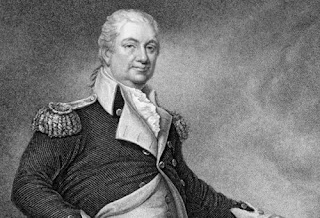Henery Knox 1750-1806
Henry Knox (1750-1806) was an important figure during the American Revolutionary War and a significant founding father of the United States. He played a crucial role in the early years of the nation's history and held several key positions in the government.
His Military Service: During the Revolutionary War, Henry Knox served as an artillery officer and later became the Chief of Artillery for the Continental Army under General George Washington. He played a pivotal role in securing much-needed artillery and ordnance for the American forces. One of his most famous achievements was leading the transportation of captured British cannons from Fort Ticonderoga to Boston, where they were used to force the British evacuation from the city in 1776.
First Secretary of War: After the war, Knox was appointed as the first Secretary of War in the newly formed United States government under the Articles of Confederation. In this role, he was responsible for organizing and overseeing the military and played a vital role in establishing the framework for the country's defense and security.
Henry Knox was one of the founding fathers of the United States and actively participated in the nation's early development. He attended the Constitutional Convention in 1787, where he contributed to the crafting of the U.S. Constitution. Knox's military and administrative experience provided valuable insights into structuring the nation's defense and helped shape the future of the young republic.
Apart from his role in the military and government, Knox also served as a diplomat and participated in various public service positions. He was involved in treaty negotiations with Native American tribes and was influential in promoting westward expansion and settlement.
Henry Knox's contributions to the American Revolutionary War, his role in the early government, and his dedication to public service make him an important and significant founding father. His expertise in military matters and his commitment to the principles of liberty and independence were instrumental in shaping the United States during its formative years.



Comments
Post a Comment